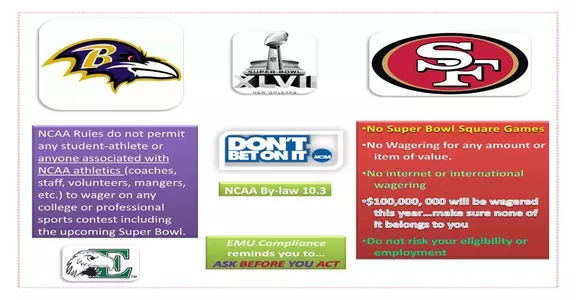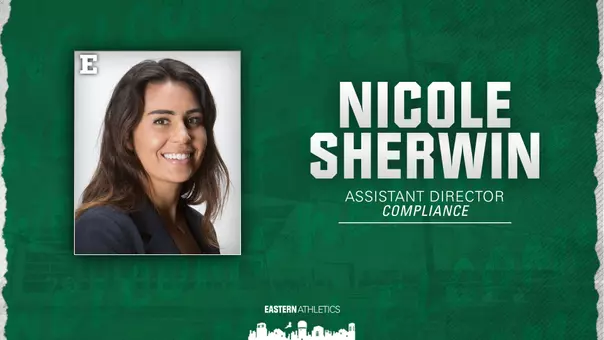Eastern Michigan Athletics

Super Bowl Gambling Reminder
1/28/2013 4:53:00 PM | Compliance
SPORTS WAGERING
FREQUENTLY ASKED QUESTIONS
What is the NCAA's position on gambling?FREQUENTLY ASKED QUESTIONS
The NCAA opposes all forms of legal and illegal sports wagering. The NCAA believes sports should be appreciated for the benefits of participating or watching, not the amount of money that can be won or lost depending on the outcome of the games.
Why does the NCAA care about gambling?
Sports wagering threatens both the well-being of student-athletes and the integrity of the game.
How does the NCAA define sports wagering?
Wagering is defined as putting something at risk – such as an entry fee or a wager – in return for the opportunity to win something.
What are the NCAA rules regarding sports wagering?
Student-athletes, coaches, athletic department and national office staff cannot place a wager on any college or professional sporting event in which the NCAA conducts a championship.
This includes:
1. Wagers for items such as cash, meals or apparel,
2. Fantasy sports leagues, or
3. Sports pools such as March Madness bracket contests.
Additionally, student-athletes, coaches and athletic department staff may not share information that could be used to wager on sports, including:
1. Injury updates,
2. Team disciplinary actions, or
3. New plays or schemes.
What are the consequences if student-athletes wager on sports?
Consequences include:
1. Loss of eligibility.
2. Jail Time. With the exception of a small number of government-sponsored lotteries and parlay betting programs, sports wagering is illegal in every state except Nevada. Additionally, internet gambling is illegal and a federal crime.
3. Threats and possible harm. Student-athletes that wager on sports are viewed by organized gambling as easy marks for obtaining inside information or affecting the outcome of a game.
4. Financial hardship.
5. Media scrutiny.
6. Loss of future employment.
.
Why does the NCAA care about small amounts of money wagered between friends on the March Madness tournament?
Bracket contests and sports pools are illegal in most states and often times serve as the entry point for youth to begin gambling. The NCAA believes fans should enjoy the games for the competition and not for the money they could possibly win.
How can you avoid trouble related to sports wagering?
1. Stay out of casinos and horse tracks.
2. Avoid contact with known gamblers, including friends.
3. Avoid online gambling.
Why should prospective student-athletes avoid wagering on sports?
Prospective student-athletes should avoid wagering on sports because it makes them a target when they enter college. Often times sports wagering is funded by organized crime and if a prospective student-athlete is wagering with someone connected to organized crime, they may be exploited once they enter college.
Eagle Eye Epiosde 5: Tap-A-Roo
Thursday, February 14
Eagle Eye Epiosde 5: Tap-A-Roo
Monday, February 11
2013 NCAA Convention: Opening Business Session
Monday, January 21
EMU President Talks about Boosters!
Wednesday, December 19




